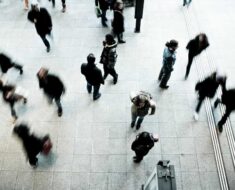Would YOU suffer through the flu for $3,500? Scientists offer to pay guests at ‘Hotel Influenza’ in a desperate bid to develop a universal vaccine
- St Louis University is opening a research facility dubbed ‘Hotel Influenza’
- Researchers there are offering $3,500 to volunteers willing to be exposed to flu
- Participants will get a private room, either a real or placebo vaccine and 10 days in the ‘hotel’
- This ‘human challenge’ study is part of the university’s effort to develop a universal vaccine
- It comes after the 2017-2018 flu epidemic in the US proved particularly deadly – the vaccine was only 30 percent effective
A research institution will pay you $3,500 and put you up in a hotel – if you let its scientists give you the flu.
It is all as part of the University of St Louis’s effort to develop a universal vaccine.
The school’s vaccine research department is opening a 24-room ‘Hotel Influenza,’ where volunteers will be vaccinated and then exposed to viruses in a ‘human challenge’ study.
Among the flu strains that ‘guests’ might be exposed to is the H3N2 variation that killed many children and even young adults who can usually beat the flu in the US this past season – including those that got vaccinated against the virus.
Signing up for the study will get you a 10-day stay in the hotel, which boasts such amenities as six leather recliners in front of a flat screen TV, private bathrooms, internet and a round-the-clock nursing staff.
The researchers claim their new facility is the perfect home-base for the development of a universal flu shot, which the US government says is a top public health priority.

The University of St Louis’s newly-minted ‘Hotel Influenza’ features recliners and a TV in the common room where the guests it will pay $3,500 to get the flu can convalesce in comfort
RELATED ARTICLES
- Previous
- 1
- Next
-

Dogs could cause next big flu outbreak in humans: Deadly new…
Flu shots are mandatory for 70 percent of hospital workers -…
Share this article
This past flu season proved the worst in nearly a decade, due in part to the vaccine’s relative ineffectiveness.
WHY DID THIS YEAR’S FLU SHOT FAIL TO PROTECT AMERICANS AGAINST H3N2?
This season’s flu vaccine was only about 36 percent effective overall and only 25 percent effective against the predominant and deadly H3N2 strain.
During the 2017-2018 flu season, the virus the shot was based on was said to be a ‘mismatch’ that underwent mutations during development.
Each year, a number of candidate flu vaccine viruses are selected and injected into eggs where they are incubated and replicate, or multiply, for several weeks.
During this period, like any living thing, the virus cells are liable to mutate before the antigens – the part of a virus that provokes an immune response – are extracted.
These antigens put the immune system on high alert for that particular strain of a virus, so that the body is primed to attack it over any other pathogen.
If the antigens come from a mutated virus, they may not provide the correct preventative immune response.
But University of Chicago research suggested this year that the shot’s effectiveness depends largely on each individuals history of flu exposures and shots, or immune history.
The human immune system seems to pick up on the presence of a flu strain – from either the vaccine or the flu itself – and respond as if it were whatever the first strain it encountered had been.
Depending on how vicious a strain the country finds itself up against, annual death tolls range between 33,000 and 49,000.
Each year, the Centers for Disease Control and Prevention can do little more than make an educated guess what strains will strike the US, and develop a corresponding vaccine.
This year, they didn’t quite make the mark, and the shot was estimated to be only about 30 percent effective.
Cutting out the guesswork and developing a vaccine that targets many strains or the portions of the virus that do not mutate from year to year could save many lives.
But making a formula that sets off such a strong and broad response from the immune system without making you sick in the process is tricky.
A few universal vaccine animal studies have shown promise, but little research has been done with human subjects.
In February, the National Institute of Allergy and Infectious Diseases (NIAID) released its plans and expectations for the development of a universal flu vaccine.
Key to that plan is will be conducting ‘human challenge studies.’
Dr Daniel Hoft, director of St Louis University’s (SLU) Center for Vaccine Development and his team want to be among the first to sicken Americans for the sake of science.
‘Human challenge studies are a way to get a lot of information quicker, with a smaller number of volunteers and less cost than a traditional vaccine study,’ Dr Hoft said.

Every guest that agrees to let the SLU researchers test the vaccines they are developing by exposing them to the flu will get their own private room. There are 24 in total at the ‘hotel’

In theory, some study participants may not get the flu if the vaccine tested on them works. For those who stay well, the Hotel Influenza even features an exercise room
In more traditional, less risky flu studies, doctors just give study participants a flu shot and measure whether or not their bodies produce the desired antibodies in response.
Human challenge studies take the research model up a notch: ‘we vaccinate people, then deliberately challenge their bodies by exposing them to flu to see if they get sick.’
These kinds of experiments are important to the early stages of vaccine research as they allow scientists to study the safety and effectiveness of the shot more quickly and at a relatively low price point.
According to the SLU press release, the volunteers for this kind of research typically get paid $3,500 ‘for their time and travel.’
The researchers there will give half of the participants a real experimental vaccine, and the other half will get a placebo.

Some rooms at Hotel Influenza offer picturesque views to their quarantined occupants, so they can look at the city’s iconic arch from a distance safe to uninfected St Louis tourists

Since everyone at Hotel Influenza gets expose to flu, they can interact with one another in common areas, they just can’t leave the premises
Then, they will begin their stay at Hotel Influenza, spending 10 days quarantined in rooms with high-grade filtration systems, face masks instead of eye at SLU.
For those who do not get sick, they will have an all-expenses paid vacation in the company of nurses, and, if they are not shedding the virus they will be released to go home early.
The others will have the same, just in a sorrier state.
But this will all be very helpful to the flu researchers, giving them a rare opportunity to observe the flu and a potential vaccine against it in a controlled environment.
‘You know when they’re exposed to the flu, so can plan exactly when to study it. You are not waiting for nature to take its course,’ Dr Hoft said.
‘If a challenge trial shows the vaccine protected a small group of volunteers against flu, you can be much more confident the vaccine is more likely to be worth the hundreds of millions of dollars of investment to go through phase three development.’
This special environment means that study participants can get multiple strains of the flu for the price of one.
‘We can give people a vaccine and challenge them with more than one virus, maybe at different times, to quickly access the actual breadth of protection against different strains of flu,’ Dr Hoft said.
‘This is important because no one vaccine currently protects against all strains of influenza, which changes year to year.’
Source: Read Full Article





